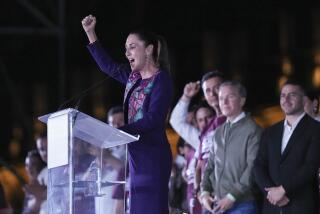Sandinista then, Machiavelli now
Managua — AFTER THREE consecutive unsuccessful efforts to regain the Nicaraguan presidency, Daniel Ortega could have accepted that he’s not liked as much as he thinks he is. Instead, he is going for it a fourth time in Sunday’s presidential runoff election.
Ortega has twisted and turned Nicaragua’s political system and electoral laws to improve his chances. He is leading in the polls, and although his approval numbers are the lowest he’s ever had -- 30% -- he, unfortunately, has a good chance of regaining the office he held from 1985 to 1990.
This is partly because the ruling, right-wing Constitutional Liberal Party has been beset by corruption scandals and rampant inefficiency; also, unemployment is at 17% and many Nicaraguans have left the country in search of jobs. But Ortega’s standing in the polls is largely the result of political opportunism and not renewed popularity. If he is elected, his accomplishment will be worthy of a Machiavellian prince.
I know that what I am saying will dismay those who supported Nicaragua in the 1980s, when Ortega and the Sandinistas ruled -- and rejected President Reagan’s dirty war against my country. They might see Ortega’s return to office as another example of the resurgence of the Latin American left after the failure of neo-liberal policies.
I for one wish that were true, but that is not the case. In the last 16 years, Ortega’s obsession with power has damaged and split the Nicaraguan left and turned the Sandinista National Liberation Front, or FSLN, into a personal project run by him and his powerful wife, Rosario Murillo .
In 1990, Ortega and the FSLN lost the presidency to Violeta Chamorro but still got 42% of the popular vote. The FSLN became the second-largest political party in the country. Nicaragua could have benefited from such a well-organized, committed, left-leaning opposition, but Ortega purged the party of its most well-known political figures and stifled the democratic process, which questioned the cult of personality he and his wife encouraged.
Since 1990, Ortega’s priority has been to be president again. What he has been willing to do to achieve his objective -- including having a former Contra as his running mate this time and undergoing a religious “conversion” -- could fit into the more twisted parts of a Gabriel Garcia Marquez novel.
His current campaign began in earnest in 1999, when Ortega used his political leverage to coax the corrupt then-president, Arnoldo Aleman of the Constitutional Liberal Party, to sign backroom power-sharing agreements with the Sandinistas. That alliance has come to be known as “el pacto” and has been repudiated by most sectors of society. Among other things, this pact led to a constitutional amendment allowing a candidate to win in the multiple-candidate first round of the presidential election with just 35% of the vote, which analysts aids the Sandinistas.
The pact also allowed Ortega to increase the number of his allies on the Supreme Electoral Council, the supreme court and in the comptroller’s office, giving him partisan control of these national institutions. Ortega’s backstage maneuvering on the council, for example, was part of his campaign strategy. The council, which supervises elections, is important because irregularities in its functions could lead to voter fraud.
The council’s chairman, Roberto Rivas, is a close associate of Nicaragua’s powerful Cardinal Miguel Obando y Bravo, a longtime nemesis of Ortega. Winning Obando to his side became key in tipping the balance of the council in Ortega’s favor. In 2006, Ortega began visiting Obando constantly. Ortega and Murillo asked to be married in a ceremony officiated by Obando.
Then in October, the legislature banned all abortions, including those to save a woman’s life -- which had been legal since the 19th century -- with the votes of a majority of Orteguista deputies. This was meant to signal to the Catholic Church the true nature of the Ortegas’ “conversion.”
The strategy worked. Obando is now appearing in campaign TV spots implying that Ortega deserves another chance, and Rivas has switched alliances on the council in favor of Ortega.
Despite his calls to prayer and his mentions of God and the pope at every campaign rally, Ortega still is not a very sympathetic figure for most Nicaraguans. But now he only needs 35% of the vote -- mostly from deeply religious and poorly informed campesinos who think he can improve their lot -- to win.
This is the sad nature of Daniel Ortega’s comeback.
More to Read
Sign up for Essential California
The most important California stories and recommendations in your inbox every morning.
You may occasionally receive promotional content from the Los Angeles Times.










